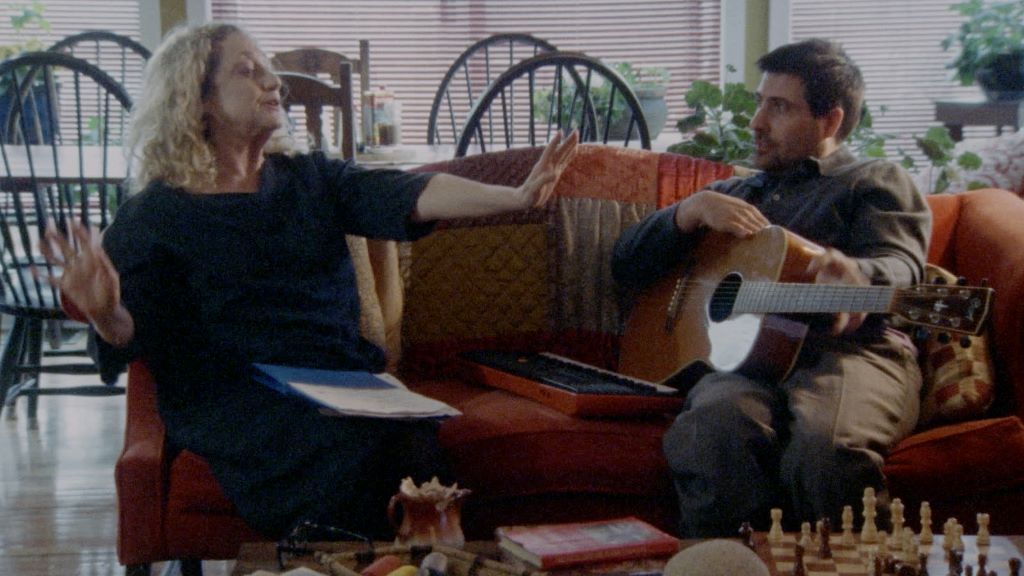Reviews include The Shrouds, On Swift Horses, and The Legend of Ochi.
TFCA Friday: Week of August 23
August 23, 2024

Welcome to TFCA Friday, a weekly round-up of film reviews and articles by TFCA members.
In release this week
Between the Temples (dir. Nathan Silver)
“Silver doesn’t give us many full scenes. With tight shots and his technique of keeping the camera moving in a documentary style, he doesn’t give us a full picture of most of the characters. We see enough to know that there’s love and affection in Ben’s world, and a sense of family,” notes Karen Gordon at Original Cin. “But like most of us, the people in Ben’s extended family all have their own worries, quirks, and opinions, and everyone reacts to him out of love and concern, but also from their own particular point of view. It’s simultaneously loving and claustrophobic.”
“Though one might complain of the script’s lack of focus on any problem, that is actually the way life plays out,” notes Gilbert Seah at Afro Toronto. “Like life, the film is best enjoyed by just sitting back and seeing how it plays out.”
“Silver isn’t making the viewer earn these laughs or forcing them to do a lot of heavy lifting, but rather allows them to be present in the moment. It’s a satisfying, feather touch approach that creates a philosophically enriching look at something that goes even deeper than the film’s exploration of religious faith or the power of attraction,” adds Andrew Parker at The Gate. “Between the Temples is an intelligent look at the ways we choose to spend our time on earth and making the most of the moments and people that fate puts in one’s path.”
“Although sometimes dizzying and disorienting, the visual language of Between the Temples is relentlessly alive, with the camera never considering-slash-allowing for the possibility that its audiences’ eyes might wander. Consider Silver’s throw-back aesthetic both a cure for contemporary boredom and a not-so-veiled threat against the temptation to become distracted by whatever is happening on your phone,” says Barry Hertz at The Globe and Mail. “This sense of committed grit extends to the performances. Schwartzman, after delivering one of the most lived-in performances of his career in last year’s Asteroid City – playing another widower trying in vain to move on – wholeheartedly embraces Ben’s flirtation with moral and even spiritual disaster.”
“Kane is glorious, finally in a major film role to remind us how gifted she is as a theatrically trained actor/comedian,” notes Anne Brodie at What She Said. “The pair of them are comedy magic. Even the camera angles are funny at times as when Ben goes into a Roman Catholic church and is dwarfed by its gilded magnificence. The priest, halting and snooty is whimsically funny as he tries to make out what Ben, a Jewish cantor wants with his opinion. Silver wastes no opportunity to laugh at life and includes dietary humour, a Yiddish rock video, and the Jewish convert finding fault with everyone else’s Jewish-ness. This is a big feast of a comedy open to all faiths.”
Blink Twice (dir. Zoe Kravitz)
“Even though we know something is afoot, we rarely feel certain in our stance and never fully understand what we just saw. The mechanics of the plot may be a little wonky, but the truth about what’s going on is as close as the nearest headlines,” writes Peter Howell at the Toronto Star. “We’re filled with unease knowing that it’s something controlled by men and not good for women, a feeling all too common in these #MeToo times.”
“When it comes time for Kravitz to show her hand and reveal what’s truly happening on the island, Blink Twice gets very bleak and disturbing in a hurry, effortlessly turning on a dime,” notes Andrew Parker at The Gate. “And while some viewers might be able to piece the big twist together before it arrives, it will still hit like a ton of bricks thanks to how shockingly and brutally Kravitz chooses to expose it.”
“The film contains a twist ending that though is not that credible but given the mood of the film is completely acceptable, The audience is expected to believe a whole lot of nonsense, which fortunately is very entertaining nonsense that propels the plot to a higher level,” says Gilbert Seah at Afro Toronto. “The film gets my vote for this year’s Best First Feature.”
The Clean Up Crew (dir. Jon Keeyes)
“There is nothing really fresh in the storyline, something that audiences have seen time and again in a British gangster movie, British or American in one form or another,” says Gilbert Seah at Afro Toronto. “Still, the film, running at an efficient 95 minutes is a fast and entertaining watch primarily for the reason that the impressive cast take the script by Matthew Rogers quite seriously.”
Close Your Eyes (dir. Victor Erice)
“Close Your Eyes carries with it a sadness and sense of tragedy, both historic and personal, but Erice (El Sur, Dreams of Light) shifts the tone with ease towards something a bit more hopeful in the second half” says Andrew Parker at The Gate. “History refuses to resolve itself in its most stubborn moments, but movies and written works can help people make sense of all the chaos.”
The Crow (dir. Rupert Sanders)
“Incoherent and cheap, with its aesthetic sensibilities seemingly cribbed from an elevator pitch of ‘John Wick goes goth,’ Sanders’s version of The Crow is a truly ugly thing to endure,” groans Barry Hertz at The Globe and Mail. “The movie not only misinterprets the tragic romance of James O’Barr’s original comic book series, but does so in such a brazenly soulless manner that you wonder if anyone involved – from Sanders and his screenwriters to the comically high number of producers who give themselves priority billing in the opening credits over the cast – has ever actually seen a movie before. This is as much a cry for help as it is an exercise in intellectual property malpractice.”
“This isn’t The Crow for the brooding, Cure listening, leather jacket, piercings, and cigarettes crowd,” advises Andrew Parker at The Gate. “Sanders has made this one for the upwardly mobile, Burning Man attending, Urban Outfitters, CyberTruck, and neon glowing vape pen crowd. And, again, it might not have been all that bad if any of this was staged with some energy. It’s bad enough that the action is kept to a frustrating minimum for the first 80 minutes of what feels like three weeks of movie, but one thing The Crow shouldn’t have is a montage where our hero has a chill session at the lake with friends that looks less like a scene out of a gritty revenge thriller and more like a commercial trying to sell the audience on a new RV.”
“[A] sorry remake of the gothic classic that lacks energy in almost every department,” sighs Gilbert Seah at Afro Toronto.
The Deliverance (dir. Lee Daniels)
“The film is gripping and scary during the first three quarters only failing in the last quarter when Lee goes overboard with the exorcism, sorry deliverance, complete with the possessed child breaking her straps and crawling up the sides of the walls of the hospital,” writes Gilbert Seah at Afro Toronto.
Incoming (Dave Chermin)
“The film tries too hard to cover all areas like family relationships, trying to be cool and political[ly] correct,” says Gilbert Seah at Afro Toronto. “With a minor gay theme and Ben’s girlfriend being coloured, it is obvious that the film is not going toward the way it is supposed to be. Also included are gross-out jokes like fart and shit jokes and sex jokes. Again all unfunny!
Lost in the Shuffle (dir. Jon Ornoy 🇨🇦)
“Lost in the Shuffle is part history of playing cards, part modern magic show and part Medieval cold case, the last referring to the death in 1498 of France’s King Charles VIII. Did the 27-year-old actually expire after hitting his head on a door frame? Or was it… murder?” asks Chris Knight at Original Cin. “As he develops his regicidal thesis, Farquhar travels the world, touching down in several far-flung cities to learn at the feet of fellow masters of what might be deemed duoquinquagenet prestidigitation. You know, card tricks.”
(Trailer not available)
Love 2020 (dir. Jacqueline Joseph)
“The doc recaps and captures the dismal times the world, including tennis players endured,” writes Gilbert Seah at Afro Toronto. “Though nothing really new is put forward that audiences have not experienced, the doc does remind one of human’s resilience amidst crises.”
Nice Girls (dir. Noémie Saglio)
“The film aims to be light and funny, action-packed with little violence and with a bit of mystery the story with a few twists,” says Gilbert Seah at Toronto Franco. “The film achieves its aim without too much fanfare, ending up a forgettable little French light action flick suitable to watch on Netflix.”
The Other Laurens (dir. Carl Schmitz; Aug. 27)
“The Other Laurens attempts, to director Schmitz’s credit to be a modern homage to the sun-drenched California noirs of the 1970s, injecting their laid-back, cynical vibe with a healthy dose of stylish European minimalism. This tactic works lifting the film out of the doldrums,” says Gilbert Seah at Toronto Franco.
The Secret Lives of Orangutans (dir.Huw Cordey)
“The doc is pleasant to watch because of the pleasant music played throughout the soundtrack and Attenborough’s soothing voice,” says Gilbert Seah at Afro Toronto. “The film is also family-watching fare, with little violence and gore. There are no scenes of animals killed as prey. Even male dominance is decided by a test of strength rather than a fight.”
Strange Darling (dir. JT Mollner)
“Strange Darling is a thriller structured as a complex series of surprises. Writing anything much about the story runs the risk of spoiling some of those surprises, so this will be a short review. Go and see it,” says Liz Braun at Original Cin. “We can tell you that the movie begins with text spelling out what you’re going to witness: the last hurrah of a serial killer who operated in Colorado, Wyoming, Idaho and finally Oregon, where the story is set.”
“As can be observed, the story is not told in chronological order. The order is clearly in the order of nastiness, each chapter, nastier than the previous with the ending in a very, very nasty climax. Strange Darling is indeed the nastiest film to be seen on the screen this year,” observes Gilbert Seah at Afro Toronto. “Whether the nastiness would entertain one is of course, up to the individual’s taste, but the film is to director JT Mollner’s credit, is quite well put together with a solid build-up.”
“Once the pieces of Mollner’s work start to come together, it becomes apparent that the viewer has been locked into a real ‘take it or leave it’ proposition,” writes Andrew Parker at The Gate. “Things grow progressively more uncomfortable, and not because of Mollner’s penchant for gory, brutal violence. As it came into focus, I began to question – and still do, weeks after watching it – if this was a prudent hill worth dying on and expanding so much energy upon.”
The Supremes at Earl’s All-You-Can-Eat (dir. Tina Mabry)
“Like the title suggests, The Supremes at Earl’s All-You-Can-Eat is a well done bit of comfort food for the soul. It’s also a lot, bordering on too much to take in during a single sitting,” notes Andrew Parker at The Gate. “It’s a familiar feeling old school melodrama about an unbreakable bond between a trio of life long best friends, which is fine, but in a bid to ensure everyone is as well rounded as possible, The Supremes at Earl’s All-You-Can-Eat races through a lot of plot and development without much time to let things breathe or sink in.”
“Sometimes an all-you-can-eat buffet isn’t as good as one well-prepared course. Such an approach to curating a menu seems to be the dilemma with The Supremes at Earl’s All-You-Can-Eat. This adaptation of the popular novel by Edward Kelsey Moore offers a little bit of everything. But the quick bites of the book’s narrative beats might not prove a satisfying meal for everyone at the table,” writes Pat Mullen at That Shelf. “The screenplay by Cee Marcellus (The Woman King’s Gina Prince-Bythewood under a pseudonym) and director Tina Mabry heaps the plate best it can. The Supremes is one of those adaptations that careens through plot points of a book. It covers heartache, joy, love, and death while following the friendship of three women over three decades. It is, frankly, a lot to digest.”
A Festival of Festival Coverage: TIFF and T-Rex
At POV Magazine, Pat Mullen looks back at the documentary T-Rex, which gets a dramatic treatment as the Hamilton-shot boxing movie The Fire Inside. “Drawing from over 400 hours of footage shot with Shields during her bouts, T-Rex ends not long after the 2012 Olympic run…In the years since T-Rex, Shields has kept her streak going, including successfully defending her title and scoring Olympic gold in Rio de Janeiro in 2016,” writes Mullen. “The interest in Shields’ victory prompted Universal Pictures to buy her life rights that year and harness T-Rex’s modest success to bring the inspiring tale to a wider audience as a drama…It probably helps, too, that enthusiastic notices in Variety and The Hollywood Reporter both likened Shields’ fire to Hillary Swank’s boxer in Clint Eastwood’s Oscar winner Million Dollar Baby—extra catnip for a studio hungry for a prestige project.”
TV Talk/Series Stuff
On In the Seats with…, Dave Voigt has been very talkative and chatting with several Emmy nominees on the campaign trail. He talks a walk down the runway with RuPaul’s Drag Race director Nick Murray, Physical choreographer Jennifer Hamilton, Slow Horses film editor Zsófia Tálas, The Daily Show director David Paul Meyer, Palm Royale composer Jeff Toyne.
At What She Said, Anne Brodie reports on the supernatural Nordic Noir series Veronika, saying it “is a kind of mashup of police procedural, ghost story, thriller and character study. Not entirely sure it works given the surprising combo and it’s also extraordinarily dark in appearance as well as subject matter. Sometimes it’s impossible to see who’s speaking. The dark palette would seem to be a serviceable framework to support the show’s spirit but when you can’t see where or who the actors are, it’s just not helpful. Dark corners offer up hallucinations. But my eyes!” Meanwhile, The Good Ship Murder is “fun, lighthearted, not exactly Shakespeare or Agatha Christie, and boasts eight glorious locations and a ship full of dodgy types.”
At POV Magazine, Pat Mullen looks at the doc series Sounds & Pressure: “Sounds and Pressures works as a feature doc if one streams the episodes in succession and, in a way, probably benefits the five stories by bringing them together. Each episode builds upon the themes and political heft of its predecessors, making for a smartly structured work that tackles one vibrant music scene from a multitude of angles. The talking heads approach also honours the voices that play a part in this history. They work as tracks, but play better as an album.”



